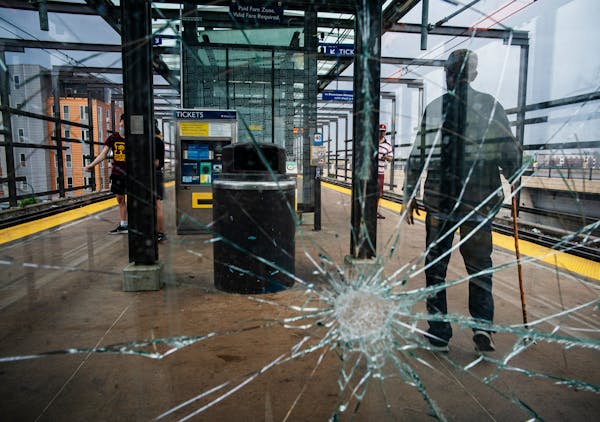Metro Transit will locked the doors of the troubled Uptown Transit Station in Minneapolis at 10 p.m. Wednesday, and the indoor waiting facility on Hennepin Avenue won't reopen until new security measures are in place this spring.
Rampant property damage, vandalism, drug use and other activities that don't involve people waiting for a bus led the transit agency to take the drastic step, said Metro Transit spokesman Drew Kerr.
"With all our facilities, the intention is for them to be an amenity for customers. People need that space to stay warm while waiting for their trip [to] arrive," Kerr said. "Closing this facility is not what we would like to do. It is necessary to stem the abuse."
For months, Metro Transit has heard from riders and bus drivers about activities at the station they should not have witnessed, including children being exposed to fentanyl use, said Ryan Timlin, president of Local 1005 of the Amalgamated Transit Union, which represents bus and light-rail operators.
"It's becoming an unsafe situation," Timlin said. "A lot of the broader social issues are spilling onto the transit system, straining and stressing the system. We need social services to address those issues. There needs to be shelters. Transit can not be shelters."
The Metropolitan Council, which oversees Metro Transit, on Wednesday approved a $6 million contract with Allied Universal to place unarmed security officers in the Uptown station and five other locations, including the vertical circulation building linking the St. Paul skyways to the Green Line's Central Station where there was a fatal shooting in December.
Guards also will be placed at the Blue Line's Lake Street/Midtown and Franklin Avenue stations, the Chicago-Lake Transit Center, and the Brooklyn Center Transit Center.
Metro Transit briefly shut down the Chicago-Lake Transit Center and put murals on windows to curb vandalism, but the station has since reopened. Station hours have been reduced at the Brooklyn Center Transit Center.
The measures come following Metro Transit's report that crime on trains and buses in 2022 increased by 54% over the the previous year. Narcotics and weapons complaints soared by 182% and 145% respectively, and liquor law violations rose by 92%, officials said.
To tackle crime, the agency came up with 40 action steps to improve public safety, ranging from hiring more police to repairing vandalized stations. In downtown St. Paul, Metro Transit installed an intercom system in the building connecting the skyways to Central Station. The building is closed for now, but when it reopens the intercom system will enable staffers to let criminals and vandals "know we see what is happening here," Kerr said.
While security guards are being hired and trained, Metro Transit will give the Uptown Station, at Hennepin Avenue and W. 29th Street, a "deep clean" and make other repairs, Kerr said. Bus operators will be able to use the restrooms and break room, but customers will have to wait outside and use temporary shelters for protection from the elements, he said.
With maintenance crews continually picking up trash and replacing broken glass at the Uptown Station, things got to a "tipping point" and Metro Transit decided to close the station, Kerr said. Riders, he said, appreciate that action is being taken.
"They are happy this has happened," Kerr said. "It's not a nice thing when you don't or can't use it safely. We had to intervene."

Want to share info with the Star Tribune? How to do it securely

'Safe recovery sites' would offer syringes, naloxone and more to people using drugs. The plan could be in peril.
New Minnesota GOP leaders seek peace with party's anti-establishment wing

Who is Republican Lisa Demuth, Minnesota's first House speaker of color?

